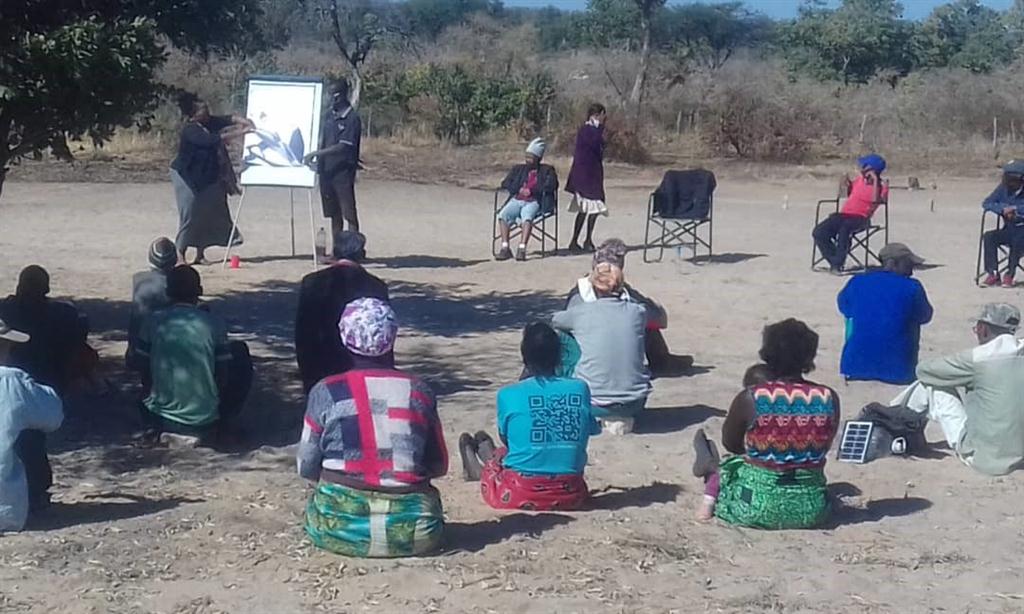Conservancy consultations resume after lockdown
ELLANIE SMIT
WINDHOEK
The N?a Jaqna Conservancy has resumed village consultation meetings with its members that were put on hold earlier this year due to the coronavirus lockdown.
According to a statement by the Nyae Nyae Development Foundation, the village meetings form part of a European Union-funded conservancy governance project that started in March. The foundation said as lockdown restrictions began to ease, the N?a Jaqna Conservancy management team restarted community consultations earlier this month, while ensuring that they comply with social distancing and sanitation requirements.
Too important
“The coronavirus cannot and was not going to indefinitely block the community consultation and engagement, they are simply too important,” said the foundation.
It added that maintaining good health in the communities is equally important and that is why the consultations took on a slightly different look and feel.
The village meetings are part of preparations for the N?a Jaqna Conservancy annual general meeting, but are also being used as an opportunity to discuss governance and communication with the villages.
The project is taking a human-rights-based approach to improving governance in the area, hiring a local San woman, Kileni Fernando, to speak with the community and gather their views on governance and how to improve it.
According to the foundation, conservancies often have significant communication issues because of their remoteness and lack of communication infrastructure. Adding to this challenge are the significant transport costs as they try to engage their dispersed members. This is particularly true of the N?a Jaqna Conservancy whose 2 000 members are distributed throughout the 9 000 km² of the conservancy.
The foundation said the community consultations have brought up topics such illegal fencing, illegal grazing and the need for better maintenance of water infrastructure.
“Also the perception of, and actual lack of, government support for the conservancies. People value the conservancy and believe they would be a lot worse off without it. They appreciate the right it has given them over the land and resources and the benefits it provides in terms of funeral support and additional school food.”
All relevant issues and points raised will be collated and collective solutions sought where possible.
WINDHOEK
The N?a Jaqna Conservancy has resumed village consultation meetings with its members that were put on hold earlier this year due to the coronavirus lockdown.
According to a statement by the Nyae Nyae Development Foundation, the village meetings form part of a European Union-funded conservancy governance project that started in March. The foundation said as lockdown restrictions began to ease, the N?a Jaqna Conservancy management team restarted community consultations earlier this month, while ensuring that they comply with social distancing and sanitation requirements.
Too important
“The coronavirus cannot and was not going to indefinitely block the community consultation and engagement, they are simply too important,” said the foundation.
It added that maintaining good health in the communities is equally important and that is why the consultations took on a slightly different look and feel.
The village meetings are part of preparations for the N?a Jaqna Conservancy annual general meeting, but are also being used as an opportunity to discuss governance and communication with the villages.
The project is taking a human-rights-based approach to improving governance in the area, hiring a local San woman, Kileni Fernando, to speak with the community and gather their views on governance and how to improve it.
According to the foundation, conservancies often have significant communication issues because of their remoteness and lack of communication infrastructure. Adding to this challenge are the significant transport costs as they try to engage their dispersed members. This is particularly true of the N?a Jaqna Conservancy whose 2 000 members are distributed throughout the 9 000 km² of the conservancy.
The foundation said the community consultations have brought up topics such illegal fencing, illegal grazing and the need for better maintenance of water infrastructure.
“Also the perception of, and actual lack of, government support for the conservancies. People value the conservancy and believe they would be a lot worse off without it. They appreciate the right it has given them over the land and resources and the benefits it provides in terms of funeral support and additional school food.”
All relevant issues and points raised will be collated and collective solutions sought where possible.





Comments
Namibian Sun
No comments have been left on this article